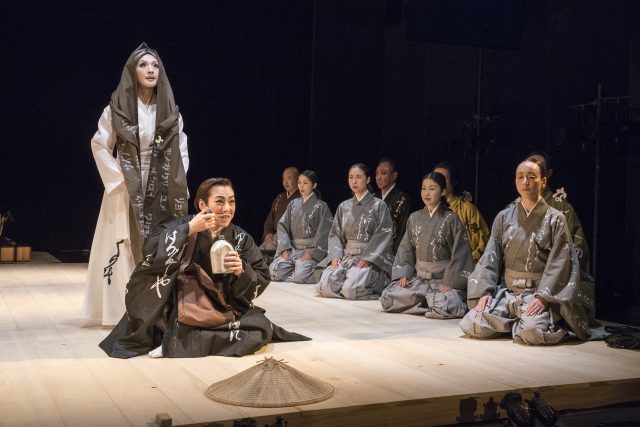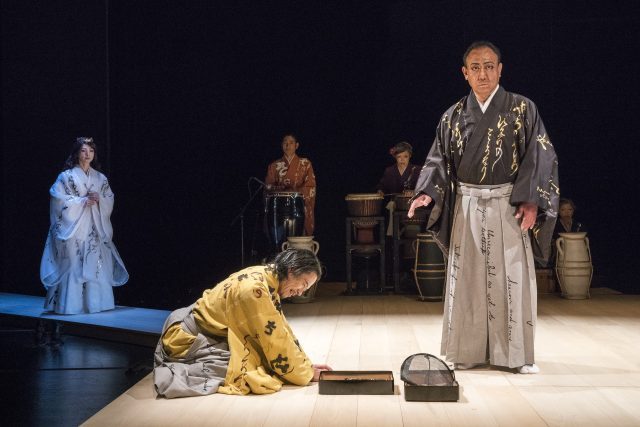
Desdemona (Micari) tells her sad tale to a traveling pilgrim (Maki Honda) from Venice (photo by Richard Termine)
Japan Society
333 East 47th St. at First Ave.
January 11-14, $35
Under the Radar continues through January 15
212-715-1258
www.japansociety.org
www.publictheater.org
Japan Society concludes its “NOH NOW” series with Satoshi Miyagi’s unique, hypnotic adaptation of William Shakespeare’s Othello, which is also part of the Public Theater’s Under the Radar festival and Japan Society’s 110th anniversary. In Mugen Noh Othello, Miyagi and his Shizuoka Performing Arts Center apply traditional mugen noh narrative structure and Miyagi’s own innovative techniques to the Bard’s story of jealousy and betrayal, condensing and refocusing the tale so it feels both fresh and contemporary as well as age-old and sadly familiar. Mugen noh stories are often told by a departed spirit in flashback, confessing to a secondary character who is a stand-in for the audience, in the hopes of gaining release to the afterlife. Miyagi’s surprise is to have a single character performed by two actors: One moves on the stage, the other sits along the right side, delivering the dialogue. Miyagi and writer Sukehiro Hirakawa also twist genre conventions by having Desdemona (mover Micari, speaker Haruyo Suzuki) as the storytelling spirit, not Shakespeare’s protagonist, Othello (Kazyniru Abe). The set is a square, slightly raised wooden platform, with an angled walkway where characters enter and exit. In the back are musicians Sachiko Kataoka, Yukio Kato, Yoneji Ouchi, Yu Sakurauchi, Junko Sekine, and Ayako Terauchi, playing traditional noh percussive instruments. (The tense score is by Hiroko Tanakawa.) On the right of the stage are a row of women and a row of men serving as a kind of Greek chorus, chanting and performing many of the lines of the play, which are translated in English surtitles on two screens. When a traveling pilgrim (Maki Honda) from Venice arrives in Cyprus, he meets a trio of Italian women (Ayako Terauchi, Sachiko Kataoka, and Yu Sakurauchi, voiced by Asuka Fuse, Kotoko Kiuchi, and Fuyuko Moriyama, respectively) who tell him how Cyprus fell to the Ottoman Turks.

Iago (Yuya Daidomumon) has some bad news for Othello (Kazyniru Abe) as Desdemona (Micari) looks on in Mugen Noh Othello (photo by Richard Termine)
“But alas, how fickle is the hearts of men,” one says. “Cyprus has turned into an island of pagans.” The pilgrim wants to know the details and is soon joined by Desdemona, who declares, “Upon meeting you, a fellow Venetian, I yearn for the world of the living.” And so she relates what happened between her husband, Othello; his trusted right-hand ensign, Iago (Yuya Daidomumon); his loyal captain, Cassio (Yoneji Ouchi); Desdemona’s father, Brabantio (Soichiro Yoshiue); the Duke of Venice (Keita Mishima); and Iago’s unknowing henchman, Roderigo (Yukio Kato), a story that leads to murder most foul. (The Tokyo-born Miyagi has also directed versions of Hamlet and A Midsummer Night’s Dream for SPAC.) “I return to tell the tale of a man trapped in a delusion,” she explains. Mugen Noh Othello features very slow, deliberate movement, with relatively sparse dialogue. Facial expressions are often exaggerated, and some characters wear masks and fab hats. Kayo Takahashi’s costumes, which come in a wide range of colors and include long, elegant, and spare lines of Japanese writing, are extraordinary, particularly Desdemona’s elaborate ghostly white and golden kimono. The play has been condensed to eighty minutes, cutting out various characters, instead concentrating on the critical, emotional high points surrounding the commission or omission of sin. It’s a lovely production rich with tender, scary, and funny moments, emphasizing the art of storytelling itself. Shakespeare purists will not find all of their favorite lines here, but there is still much poetry to revel in.